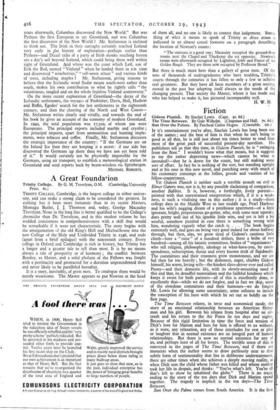A Great Foundation
Trinity College. By G. M. Trevelyan, O.M. (Cambridge University Press. 6s.)
TRDITIT COLLEGE, Cambridge, is the largest college in either univer- sity, and can make a strong claim to be considered the greatest. In nothing has it been more fortunate than in its recent Masters, Montagu Butler, J. J. Thomson and, today, Geoige Macaulay Trevelyan. None in the long line is better qualified to be the College's chronicler than Dr. Trevelyan, and in this modest volume he has wedded conciseness to comprehensiveness with a skill that would be remarkable if it were not characteristic. The story begins with the amalgamation of the old King's Hall and Michaelhouse into the new College of the Holy and Undivided Trinity in 1546, and ends (apart from a brief epilokue) with the nineteenth century. Every college in Oxford and Cambridge is rich in history, but Trinity has a longer and a greater tale to tell than most. It is by no means always a tale of prosperity or of harmony ' - the conflict between Bentley, as Master, and a solid phalanx of the Fellows was fought with a pertinacity and protracted for a duration unprecedented then and never likely to be paralleled hereafter.
It is a story, inevitably, of great men. To catalogue them would be merely wearisome. The Master appears to put Newton at the head
of them all, and no one is likely to contest that judgement. Some- thing of whet it means to speak of Trinity as dives avum is indicated in an almost casual footnote on a paragraph describing the location of Newton's rooms : "The staircase is a good one; Macaulay occupied the ground-floor rooms next the Chapel and Thackeray the set opposite. Newton's rooms were afterwards occupied by Lightfoot, Jebb and Frazer of the Golden Bough. They are those now occupied by Professor Broad."
But there is much more here than a gallery of great men. Of the tens of thousands of undergraduates who have trodden, Trinity's courts through the centuries it has fallen to only a few to achieve real greatness. But they have all been members of -a great society, rooted in the past but adapting itself always to the needs of the changing present. That society the Master, whom it has made and who has helped to make it, has pictured incomparably well.
H. W. H.


























 Previous page
Previous page